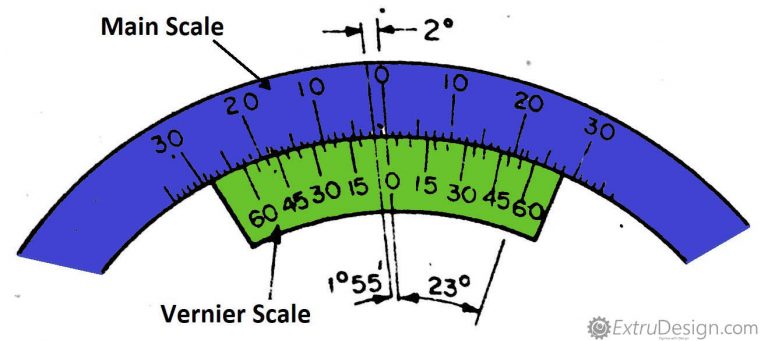https://extrudesign.com/vernier-bevel-protractor/
Working
principle of Vernier Bevel Protractor
In Metrology, The
angular measurements are frequently necessary for manufacturing
industries. Vernier Bevel protractor is one of the angular measuring instrument
used for close tolerances. We are going to discuss the construction and the
working principle of the Vernier Bevel protractor in this article.
Vernier
Bevel Protractor
Bevel Protractors are
the Angular measuring devices. Vernier Bevel protractor is the simplest angular
measuring device which is having a Vernier Scale(Similar principle as the Vernier Calliper) along with the acute angle
attachment.
(The meaning of bevel is
which is not 90°)
Construction
of Vernier Bevel Protractor
Vernier Bevel protractor
consist of the following components.
1.
Main body
2.
Base plate stock
3.
Adjustable blade
4.
Circular Plate with
graduated vernier scale divisions.
5.
Acute angle attachment
The following figure
shows the vernier bevel protractor
·
The base plate(Stock)
consisting of the Working edge will be mounted on the Main body.
·
And the Acute angle
attachment is also mounted on the main body.
·
This acute angle
attachment can be readily attachable/detachable with the Locking Nut.
·
A circular plate having
a vernier scale in it, also mounted on the Main body frame.
·
This circular plate is
carrying an adjustable blade which can travel along its length and locked
at any position with the help of the blade locking nut.
·
The adjustable Blade one
end is bevelled at angles 45° and the other end is bevelled at 60°.
·
This Main body
frame itself having a graduated scale called the main scale.
·
The circular plate can
rotate freely on the main body.
·
There is a slow-motion
device which helps to control the rotation of the circular plate on the main
body.
This is the construction
of the Vernier Bevel Protractor
Working Principle of Vernier Bevel Protractor
1. As the Base Plate (Stock) acts as one of the working edges, and the other working edge will be the blade which is held on the circular plate. as you can see the some of the sample positions of the Vernier bevel protractor in action.
2. This Adjustment Blade
can be rotated along with the circular plate on the main body.
3. Which means the
vernier scale on the circular plate will be rotated on the Main scale which is
graduated on the Main body as shown in below.
4. The Vernier scale has
12 divisions on each side of the centre zero. (It means there are 24 divisions
on the vernier scale)
5. The 12
divisions are denoted as 60 min on the vernier scale (Like this 15, 30,
45, 60). That means 12 division = 60 minutes
6. One devision= 60/12 =
5 minutes.
7. On the Main scale,
the same portion is represented as 23° (12 divisions on vernier scale = 23° on
the main scale )
8. One division on the
Vernier scale = 1.91666° = 1° 55′ (one degree 55 minutes).
9. As similar to the vernier calliper working principle as
Zero on the vernier scale moves on the main scale.
10. While taking a
measurement, The Zero line on the vernier scale shows the reading on the main
scale, called main scale reading.
11. At somewhere The
divisions on the vernier scale will coincide with the divisions on the Main
scale. this reading is noted as the Vernier scale reading.
12. With these values
along with the least count of the Vernier bevel protractor, we can calculate
the Reading.
See the following
example how to calculate the total reading
Measurements
with Vernier Bevel Protractor
Consider the Following
is a reading of an angular measurement.
The total
reading =the main scale reading + the number of the
division at which it exactly coincides with any division on the main
scale × least count of the vernier scale.
In the above case
The main scale reading =
10°
Vernier scale
reading (the number of the division at which it exactly coincides with any
division on the main scale) = 3rd division
Least count of the
vernier Bevel protractor = 5 Minutes
The total reading =
10°+15 minutes = 10 + (15/60) = 10.25°






